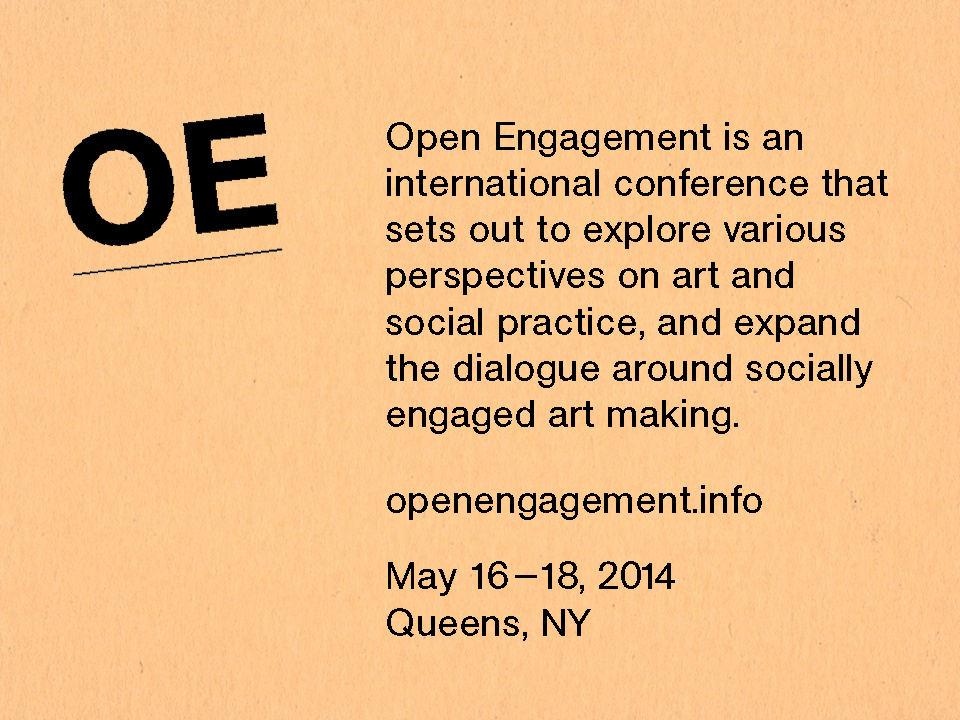Open Engagement

OE 2014
Are we focusing too much on institutions over community organizations?
Are we focusing too much on institutions over community organizations?
Institutions are like trusted brands. Our education, work and affiliations provide the necessary structure to safely categorize ourselves and others. Since class in American society is constantly in flux, we have no fixed place to stand without institutions. Therefore, our status within the social order is validated. Many view community organizations as a side note, a nice charitable gesture for other people to participate in. Is it the lack of prestige and monetary funds that marginalize community organizations?
I live in Los Angeles, Silver Lake more specifically. In 2012, Forbes proclaimed it the “Best Hipster Neighborhood in America” and Money magazine authenticated it once more in 2013. Take for instance my local neighborhood council (SLNC). There’s an election coming up on April 12th. There are a record number of candidates (59) to fill the 21 existing seats. All the incumbents feel threatened to some degree. Dysfunction and so-called “shenanigans” beleaguer the current governing board. Where are all these so-called “hipsters” during these meetings? “They’re too busy looking at their iPhones!” exclaimed one of the older candidates during this week’s Forum. It is obvious new blood needs to enter the SLNC to alleviate the power divide. How do we change apathy into excitement? Don’t these so-called “hipsters” care about what’s happening in their exceptional neighborhood?
My work as a journalist provides entrée into many relevant institutions. This week, I attended MOCA’s 35th anniversary gala. During this exclusive affair, I was able to talk about, promote and gain contacts for a large-scale public art project I’m producing through the nonprofit I founded, Creative Migration. Our work focuses on social engagement, sustainability, art and film. We are volunteer run and do not have a sizable endowment of any kind. Yet, because of my connections to institutions, I have been able to gain access to the “right” people to propel our project further. This particular event marked the beginning of a new era for MOCA by celebrating Mike Kelley’s retrospective and also welcoming Director Philippe Vergne. For this institution itself was fraught with uncertainty, upheaval and discord for months culminating with the departure of former Director Jeffrey Deitch. There’s a different level of dysfunction here, but organizational politics and strife exists on all levels.
Community organizations are fueled by passion, ideas and values to propel change from the grassroots up. Ordinary citizens have a voice and can be heard. The problem is that many people don’t know about these organizations. Institutions feel big, powerful and sexy. Community organizations feel more like an extra-curricular activity. The SLNC needs to strive for the same quality of design and outreach that MOCA has. It needs to feel relevant, to create a brand recognition that our brains can distinguish from the countless information we are bombarded with everyday. Community organizations need to appeal and adapt to the younger generation in order to survive in our Digital Age. Occupy was successful at this, but where is it now? How do we do this for the long haul?
Excerpt from POST NEW BILLS, a short documentary by Creative Migration that releases in January 2014 as a part of a two-year traveling Green Patriot Posters exhibition with Design Museum Boston.
About the contributor: Susannah Tantemsapya is a creative producer, journalist and filmmaker based in Los Angeles. She founded Creative Migration in 2005, a nonprofit that produces projects merging art, film, sustainability and social engagement. She has directed and produced several projects including POST NEW BILLS: The Story of Green Patriot Posters, which is part of a traveling exhibition with the Design Museum Boston from 2014-16. Susannah earned a degree in Photojournalism from the University of North Carolina at Chapel Hill where she started out as a music editor for ‘SUP MAGAZINE. She began working in film as a production assistant for director/theater artist Robert Wilson. Her writing has appeared in publications such as Whitewall Magazine, Canvas Magazine, art ltd. and The WILD Magazine. She is also a dual citizen of the United States of America and the Kingdom of Thailand.
susannahtantemsapya.com, creativemigration.org
Check out the online article here.
susannahtantemsapya.com, creativemigration.org
Check out the online article here.